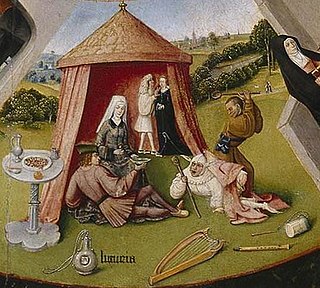
The seven deadly sins, also known as the capital vices or cardinal sins, is a grouping and classification of vices within Christian teachings. According to the standard list, they are pride, greed, wrath, envy, lust, gluttony and sloth, which are contrary to the seven capital virtues. These sins are often thought to be abuses or excessive versions of one's natural faculties or passions.

Lust is a psychological force producing intense desire for something, or circumstance while already having a significant amount of the desired object. Lust can take any form such as the lust for sexuality, money, or power. It can take such mundane forms as the lust for food as distinct from the need for food or lust for redolence, when one is lusting for a particular smell that brings back memories. It is similar to but distinguished from passion, in that passion propels individuals to achieve benevolent goals whilst lust does not.
The sex-positive movement is a social and philosophical movement that seeks to change cultural attitudes and norms around sexuality, promoting the recognition of sexuality as a natural and healthy part of the human experience and emphasizing the importance of personal sovereignty, safer sex practices, and consensual sex. It covers every aspect of sexual identity including gender expression, orientation, relationship to the body, relationship-style choice, and reproductive rights. Sex-positivity is "an attitude towards human sexuality that regards all consensual sexual activities as fundamentally healthy and pleasurable, encouraging sexual pleasure and experimentation." It challenges societal taboos and aims to promote healthy and consensual sexual activities. The sex-positive movement also advocates for comprehensive sex education and safe sex as part of its campaign. The movement generally makes no moral distinctions among types of sexual activities, regarding these choices as matters of personal preference.

To Sumerians, Babylonians, Assyrians, and Jews there were male and female demons. In Christian demonology and theology there is debate over the gender and sexual proclivities of demons. These questions are referenced in Italian, French, Spanish and Portuguese phrases that imply that the question is pointless and unanswerable, akin to the English phrase How many angels can dance on the head of a pin?.

A facial is a sexual activity in which a man ejaculates semen onto the face of one or more sexual partners. A facial is a form of non-penetrative sex, though it is generally performed after some other means of sexual stimulation, such as vaginal sex, anal sex, oral sex, manual sex or masturbation. Facials are regularly portrayed in pornographic films and videos, often as a way to close a scene.

A libertine is a person devoid of most moral principles, a sense of responsibility, or sexual restraints, which they see as unnecessary or undesirable, and is especially someone who ignores or even spurns accepted morals and forms of behaviour observed by the larger society. Libertinism is described as an extreme form of hedonism. Libertines put value on physical pleasures, meaning those experienced through the senses. As a philosophy, libertinism gained new-found adherents in the 17th, 18th, and 19th centuries, particularly in France and Great Britain. Notable among these were John Wilmot, 2nd Earl of Rochester, and the Marquis de Sade.
Sex-positive feminism, also known as pro-sex feminism, sex-radical feminism, or sexually liberal feminism, is a feminist movement centering on the idea that sexual freedom is an essential component of women's freedom. They oppose legal or social efforts to control sexual activities between consenting adults, whether they are initiated by the government, other feminists, opponents of feminism, or any other institution. They embrace sexual minority groups, endorsing the value of coalition-building with marginalized groups. Sex-positive feminism is connected with the sex-positive movement. Sex-positive feminism brings together anti-censorship activists, LGBT activists, feminist scholars, producers of pornography and erotica, among others. Sex-positive feminists generally agree that prostitutes themselves should not be criminalized.

Falling in love is the development of strong feelings of attachment and love, usually towards another person.
Sin City is a series of graphic novels by Frank Miller.
The feminist sex wars, also known as the lesbian sex wars, sex wars or porn wars, are terms used to refer to collective debates amongst feminists regarding a number of issues broadly relating to sexuality and sexual activity. Differences of opinion on matters of sexuality deeply polarized the feminist movement, particularly leading feminist thinkers, in the late 1970s and early 1980s and continue to influence debate amongst feminists to this day.
Among the world's religions, views on masturbation vary widely. Some religions view it as a spiritually detrimental practice, some see it as not spiritually detrimental and others take a situational view. Among these latter religions, some view masturbation as allowable if used as a means towards sexual self-control, or as part of healthy self-exploration, but disallow it if it is done with motives they consider to be wrong, or as an addiction. For example, Christian denominations have different views on masturbation. Today, Roman Catholic, Eastern Orthodox, Oriental Orthodox and some Protestant Christians consider masturbation to be a sin. Many Protestant churches in Northern and Western Europe and some Protestant churches in Northern America and in Australia/New Zealand see masturbation as not a sin.

Erika Lust is a Swedish erotic film director, screenwriter and producer. Since the debut of her first indie erotic film The Good Girl in 2004, Lust has been cited as one of the current leading participants in the feminist pornography movement, asserting that an ethical production process sets her company apart from mainstream pornography sites. Lust has stated that she finds no issue in calling her films porn, since she expects viewers to be sexually aroused, unlike other directors of erotic films who make a distinction between their work and porn even when both types contain sexually explicit scenes. In addition to directing and producing a number of award-winning films, she has written several books.

Sodomy, also called buggery in British English, generally refers to either anal sex between people, or any sexual activity between a human and an animal (bestiality). It may also mean any non-procreative sexual activity. Originally, the term sodomy, which is derived from the story of Sodom and Gomorrah in the Book of Genesis, was commonly restricted to homosexual anal sex. Sodomy laws in many countries criminalized the behavior. In the Western world, many of these laws have been overturned or are routinely not enforced. A person who practices sodomy is sometimes referred to as a sodomite.
Feminist views on pornography range from total condemnation of the medium as an inherent form of violence against women to an embracing of some forms as a medium of feminist expression. This debate reflects larger concerns surrounding feminist views on sexuality, and is closely related to those on prostitution, BDSM, and other issues. Pornography has been one of the most divisive issues in feminism, particularly in Anglophone (English-speaking) countries. This division was exemplified in the feminist sex wars of the 1980s, which pitted anti-pornography activists against pro-pornography ones.
Feminism has affected culture in many ways, and has famously been theorized in relation to culture by Angela McRobbie, Laura Mulvey and others. Timothy Laurie and Jessica Kean have argued that "one of [feminism's] most important innovations has been to seriously examine the ways women receive popular culture, given that so much pop culture is made by and for men." This is reflected in a variety of forms, including literature, music, film and other screen cultures.
In medieval Europe, attitudes toward homosexuality varied from region to region, determined by religious culture; the Catholic Church, which dominated the religious landscape, considered, and still considers, sodomy as a mortal sin and a "crime against nature". By the 11th century Sodomy was increasingly viewed as a serious moral crime and punishable by mutilation or death. Medieval records reflect this growing concern. The emergence of heretical groups, such as the Cathars and Waldensians, witnesses a rise in allegations of unnatural sexual conduct against such heretics as part of the war against heresy in Christendom. Accusations of Sodomy and unnatural acts were levelled against the Order of the Knights Templar in 1307 as part of Philip IV of France's attempt to suppress the order. These allegations have been dismissed by some scholars.
Catharine Arnold is a British author, journalist and academic, best known for her 'London' series of five popular history books: Necropolis: London and Its Dead (2006), Bedlam: London and Its Mad (2008), City of Sin: London and Its Vices (2010), Underworld London: Crime and Punishment in the Capital City (2012), and Globe Life in Shakespeare's London (2015). Her most recent book is Pandemic 1918: The Story of the Deadliest Influenza in History written in 2018. Catharine Arnold read English at Girton College, Cambridge and holds a post-graduate degree in psychology. Catharine Arnold is UK Council for Psychotherapy and Counselling Writer in Residence 2020.
Porn for women, women's porn or women's pornography is pornography aimed specifically at the female market, and often produced by women. It rejects the view that pornography is only for men, and seeks to make porn that women enjoy watching instead of what is being offered in male-centric mainstream pornography.

Fornication is generally immoral sexual intercourse between two people not married to each other. When one or more of the partners having consensual sexual intercourse is married to another person, it is called adultery. John Calvin viewed adultery to be any sexual act that is outside the divine model for sexual intercourse, which includes fornication.
Victorian erotica is a genre of sexual art and literature which emerged in the Victorian era of 19th-century Britain. Victorian erotica emerged as a product of a Victorian sexual culture. The Victorian era was characterized by paradox of rigid morality and anti-sensualism, but also by an obsession with sex. Sex was a main social topic, with progressive and enlightened thought pushing for sexual restriction and repression. Overpopulation was a societal concern for the Victorians, thought to be the cause of famine, disease, and war. To curb the threats of overpopulation and to solve other social issues that were arising at the time, sex was socially regulated and controlled. New sexual categories emerged as a response, defining normal and abnormal sex. Heterosexual sex between married couples became the only form of sex socially and morally permissible. Sexual pleasure and desire beyond heterosexual marriage was labelled as deviant, considered to be sinful and sinister. Such deviant forms included masturbation, homosexuality, prostitution and pornography. Procreation was the primary goal of sex, removing it from the public, and placing it in the domestic. Yet, Victorian anti-sexual attitudes were contradictory of genuine Victorian life, with sex underlying much of the cultural practice. Sex was simultaneously repressed and proliferated. Sex was featured in medical manuals such as The Sexual Impulse by Havelock Ellis and Functions and Disorders of Reproductive Organs by William Acton, and in cultural magazines like The Penny Magazine and The Rambler. Sex was popular in entertainment, with much of Victorian theatre, art and literature including and expressing sexual and sensual themes.









